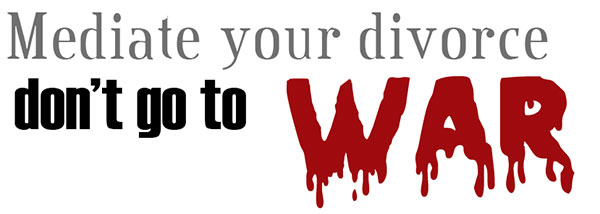Couples who have decided to separate or divorce have two choices to try to resolve their conflict.
THE LEGAL SYSTEM…..the way it is
You and your spouse each hire an attorney. One lawyer calls the other. Each attempts to gain the advantage. Neither side gives in and they become intransigent. Work on settlement issues is halted. Threatening letters are exchanged. Finally, suit is filed. First the discovery process, then document requests, then interrogatories (sometimes thicker than an encyclopedia) are exchanged. Depositions are scheduled. Then pre-trial motions, hearings and finally, trial. Protracted court battles lead to mental and physical exhaustion. Court cases can drag on for years. Meanwhile, you are living with the unknown results hanging over your head, waiting for someone else to decide your fate and future. During a divorce, sometimes it seems that everything is in chaos. After the divorce becomes final, it can take several more years for the conflicts to die down.
Even within our legal system, fairness is not something that can be easily defined. In California, property in a divorce is divided equally. In New York, it is frequently divided unequally. This is because each state has different concept of what is fair when a husband and wife divorce. No wonder the doctrine of "fairness" is as confusing within the legal system as it is in life itself.
MEDIATION…..the way I practice it
I will work with you if it is clear that you have decided to separate and I will help you identify everything that should go into your separation agreement. I begin by helping you think through all of the future parenting issues for your children based on the idea that although you are separating as husband and wife, you will always be mother and father to your children and they will always need each of you. Then I will then help you identify all of your marital assets: that is, everything of value you have accumulated during your marriage. I will help you decide how to value those and help you divide them fairly. Finally, I will help you prepare budgets to determine what it costs to live apart. Using this information together with your income information, I will help you negotiate issues of support: it any, how much, in what form, for how long.
I will do all that in a context that there shall be no losers. I will make sure that you cover everything. And I will go into great detail each area with you.
A very important aspect of my job is to manage the conflict between you. I will help you make the conflict positive rather than destructive. I will do that by keeping you focused on the tasks. And I'll be looking to the future for each of you, not the past.
However, one thing I won't do is to tell you what to do. I will share ideas with you what other couples in similar situations have thought about to give you a wide range of options for reach issue you must settle. There may be times when you say to me, "Tell us what to do." But I won't, because I don't have to live with your agreements, you do. So it must be an agreement that meets both of your needs. With my help, you can and will negotiate your own mutually acceptable agreement.
As you proceed through the process and make agreements, I’ll keep track of them and I will draft a Memorandum of Understanding or a Martial Separation Agreement covering all the agreements you reach in mediation. You then take this to your attorney or you can file the Agreement yourself. If you don't have a lawyer, I can give you a list of quality law firms that have handled mediated divorce agreements.
One of the most important goals in mediation is to ensure that the disputing parties reach an agreement in a way that protects their future relationship. This is especially true in divorce, where the couple has an ongoing relationship as parents.
I have come to believe that divorce mediation’s greatest value lies in its potential, not only to find solutions to people’s problems, but also to change people for the better, even though they are in the midst of a very intense and potentially destructive conflict. Time and again, I have seen people change in small but significant ways through their participation in this process. These changes occur because, through mediation, people find ways to avoid succumbing to conflict’s most destructive pressures: to act from weakness rather than strength and to dehumanize rather than acknowledge each other. Overcoming these pressures involves making difficult moral choices, and making these choices transforms people – changing them for the better. They discover within themselves capacities for good that they did not know existed. And they learn how to draw on these positive capacities in dealing with life’s problems and relating to others. It is this transformative potential of helping people respond with compassionate strength, as they address difficult and often painful disputes, that is the real power of mediation!



